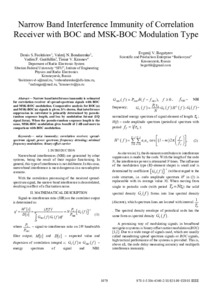Narrow band interference immunity of correlation receiver with BOC and MSK-BOC modulation type
Скачать файл:
URI (для ссылок/цитирований):
https://ieeexplore.ieee.org/abstract/document/8317277/https://elib.sfu-kras.ru/handle/2311/111440
Автор:
Феоктистов, Д. С.
Бондаренко, В. Н.
Гарифуллин, В. Ф.
Краснов, Т. В.
Богатырев, Е. В.
Коллективный автор:
Институт инженерной физики и радиоэлектроники
Кафедра радиоэлектронных систем
Дата:
2018-01Журнал:
Young Researchers in Electrical and Electronic Engineering (EIConRus), 2018 IEEE Conference of RussianКвартиль журнала в Scopus:
без квартиляБиблиографическое описание:
Феоктистов, Д. С. Narrow band interference immunity of correlation receiver with BOC and MSK-BOC modulation type [Текст] / Д. С. Феоктистов, В. Н. Бондаренко, В. Ф. Гарифуллин, Т. В. Краснов, Е. В. Богатырев // Young Researchers in Electrical and Electronic Engineering (EIConRus), 2018 IEEE Conference of Russian. — 2018. — С. 1079-1081Текст статьи не публикуется в открытом доступе в соответствии с политикой журнала.
Аннотация:
Narrow band interference immunity is estimated for correlation receiver of spread-spectrum signals with BOC and MSK-BOC modulation. Comparative analysis for BOC(n) and MSK-BOC(n) signals is given. It's shown, that interference suppression in correlator is primarily determined by pseudo-random sequence length, and less by modulation format (I/Q signal form). When the pseudo-random sequence length is the same, MSK-BOC modulation gives benefit of 2 dB and more in comparison with BOC modulation.

